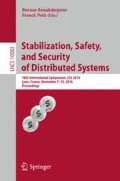Abstract
This paper addresses the multi-agent optimization problem in which the agents try to collaboratively minimize \(\frac{1}{k}\sum _{i=1}^k h_i\) for a given choice of k input functions \(h_1, \ldots , h_k\). This problem finds its application in distributed machine learning, where the data set is too large to be processed and stored by a single machine. It has been shown that when the networked agents may suffer Byzantine faults, it is impossible to minimize \(\frac{1}{k}\sum _{i=1}^k h_i\) with no redundancy in the local cost functions.
We are interested in the impact of the local cost functions redundancy on the solvability of \(\frac{1}{k}\sum _{i=1}^k h_i\). In particular, we assume that the local cost function of each agent is formed as a convex combination of the k input functions \(h_1, \ldots , h_k\). Depending on the availability of side information at each agent, two slightly different variants are considered. We show that for a given graph, the problem can indeed be solved despite the presence of faulty agents. In particular, even in the absence of side information at each agent, when adequate redundancy is available in the optima of input functions, a distributed algorithm is proposed in which each agent carries minimal state across iterations.
This research is supported in part by National Science Foundation awards NSF 1329681 and 1421918. Any opinions, findings, and conclusions or recommendations expressed here are those of the authors and do not necessarily reflect the views of the funding agencies or the U.S. government.
Access this chapter
Tax calculation will be finalised at checkout
Purchases are for personal use only
References
Anthonisse, J., Tijms, H.: Exponential convergence of products of stochastic matrices. J. Math. Anal. Appl. 59(2), 360–364 (1977)
Candes, E.J., Tao, T.: Decoding by linear programming. IEEE Trans. Inf. Theory 51(12), 4203–4215 (2005)
Chatterjee, S., Seneta, E.: Towards consensus: some convergence theorems on repeated averaging. J. Appl. Probab. 14(1), 89–97 (1977)
Chaudhuri, S.: More choices allow more faults: set consensus problems in totally asynchronous systems. Inf. Comput. 105, 132–158 (1992)
Dolev, D., Lynch, N.A., Pinter, S.S., Stark, E.W., Weihl, W.E.: Reaching approximate agreement in the presence of faults. J. ACM 33(3), 499–516 (1986)
Duchi, J., Agarwal, A., Wainwright, M. Dual averaging for distributed optimization: convergence analysis and network scaling. IEEE Trans. Autom. Control (2012)
Fekete, A.D.: Asymptotically optimal algorithms for approximate agreement. Distrib. Comput. 4(1), 9–29 (1990)
Friedman, R., Mostefaoui, A., Rajsbaum, S., Raynal, M.: Asynchronous agreement and its relation with error-correcting codes. IEEE Trans. Comput. 56(7), 865–875 (2007)
LeBlanc, H.J., Zhang, H., Sundaram, S., Koutsoukos, X.: Consensus of multi-agent networks in the presence of adversaries using only local information. In: Proceedings of the 1st International Conference on High Confidence Networked Systems, HiCoNS 2012, pp. 1–10. ACM, New York (2012)
Mostefaoui, A., Rajsbaum, S., Raynal, M.: Conditions on input vectors for consensus solvability in asynchronous distributed systems. J. ACM (JACM) 50(6), 922–954 (2003)
Mostefaoui, A., Rajsbaum, S., Raynal, M.: Using conditions to expedite consensus in synchronous distributed systems. In: Fich, F.E. (ed.) DISC 2003. LNCS, vol. 2848, pp. 249–263. Springer, Heidelberg (2003). doi:10.1007/978-3-540-39989-6_18
Mostefaoui, A., Rajsbaum, S., Raynal, M.: Synchronous condition-based consensus. Distrib. Comput. 18(5), 325–343 (2006)
Nedic, A., Olshevsky, A.: Distributed optimization over time-varying directed graphs. IEEE Trans. Autom. Control 60(3), 601–615 (2015)
Nedic, A., Ozdaglar, A.: Distributed subgradient methods for multi-agent optimization. IEEE Trans. Autom. Control 54(1), 48–61 (2009)
Pease, M., Shostak, R., Lamport, L.: Reaching agreement in the presence of faults. J. ACM 27(2), 228–234 (1980)
Robbins, H., Siegmund, D.: A convergence theorem for non negative almost supermartingales and some applications. In: Lai, T., Siegmund, D. (eds.) Herbert Robbins Selected Papers, pp. 111–135. Springer, New York (1985)
Su, L., Vaidya, N.: Byzantine multi-agent optimization: Part i. arXiv,abs/1506.04681 (2015)
Su, L., Vaidya, N.: Byzantine Multi-agent optimization: part II (2015)
Su, L., Vaidya, N.H.: Fault-tolerant multi-agent optimization: optimal iterative distributed algorithms. In: Proceedings of the ACM Symposium on Principles of Distributed Computing, pp. 425–434. ACM (2016)
Su, L., Vaidya, N.H.: Multi-agent optimization in the presence of byzantine adversaries: fundamental limits. In: Proceedings of IEEE American Control Conference (ACC), July 2016
Tsitsiklis, J.N., Bertsekas, D.P., Athans, M., et al.: Distributed asynchronous deterministic and stochastic gradient optimization algorithms. IEEE Trans. Autom. Control 31(9), 803–812 (1986)
Vaidya, N.H.: Matrix representation of iterative approximate Byzantine consensus in directed graphs. CoRR, abs/1203.1888 (2012)
Vaidya, N.H., Tseng, L., Liang, G.: Iterative approximate byzantine consensus in arbitrary directed graphs. In: Proceedings of ACM Symposium on Principles of Distributed Computing (PODC) (2012)
Author information
Authors and Affiliations
Corresponding author
Editor information
Editors and Affiliations
Rights and permissions
Copyright information
© 2016 Springer International Publishing AG
About this paper
Cite this paper
Su, L., Vaidya, N.H. (2016). Robust Multi-agent Optimization: Coping with Byzantine Agents with Input Redundancy. In: Bonakdarpour, B., Petit, F. (eds) Stabilization, Safety, and Security of Distributed Systems. SSS 2016. Lecture Notes in Computer Science(), vol 10083. Springer, Cham. https://doi.org/10.1007/978-3-319-49259-9_29
Download citation
DOI: https://doi.org/10.1007/978-3-319-49259-9_29
Published:
Publisher Name: Springer, Cham
Print ISBN: 978-3-319-49258-2
Online ISBN: 978-3-319-49259-9
eBook Packages: Computer ScienceComputer Science (R0)

